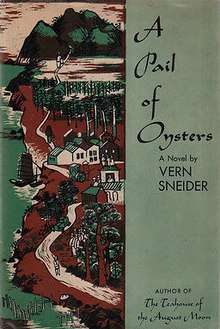A Pail of Oysters
A Pail of Oysters is a novel by Vern Sneider published in 1953. Set during Taiwan's White Terror era, the book "tells the tragic story of three young Taiwanese people who become involved with an American journalist".[1] Sympathetic to the Taiwanese people and deeply critical of Kuomintang rule, A Pail of Oysters was suppressed in the 1950s before gaining new life after the end of martial law in Taiwan.
 Cover of the first edition | |
| Author | Vern Sneider |
|---|---|
| Subject | The White Terror |
| Set in | Taiwan |
| Publisher | Putnam, Camphor Press |
Publication date | 1953 (2016) |
Aim of the novel
Sneider hoped that the book would reduce the suffering of Taiwanese people under the Kuomintang. He wrote to George H. Kerr, later author of Formosa Betrayed, saying the viewpoint in the novel "will be strictly that of the Formosan people, trying to exist under that government. And … maybe, in my small way, I can do something for the people of Formosa."[2] Jonathan Benda, in his introduction to the 2016 edition of the book, argues that Sneider's novel intended "to make Americans think in particular about the regime they supported in Taiwan, but more generally about what the U.S. role in Asia should be".[3]
Reception
On release the book received positive critical reviews, but was banned in Taiwan and was attacked by the China Lobby in the United States.[4] One academic familiar with the impact of the book commented in 2003 that "copies of A Pail of Oysters have disappeared from most libraries, probably on instructions issued to the student spies paid by the KMT to monitor Taiwanese on US college campuses".[5]
Reemergence in the 2000s
After the end of martial law in Taiwan the book was published in translated editions in both Mandarin Chinese (in 2002) and Taiwanese (2003).[6] A new English edition appeared in 2016, with an introduction by Jonathan Benda of Northeastern University.
References
- Jackson, Grace, Remembering 2-28 Across Culture, Distance and Time, Taiwan Sentinel
- Cheung, Han, Literary Redemption, The Taipei Times
- Chung, Darice, Niche Media and Taiwan’s Soft Power, Taiwan Sentinel
- Portteus, Danielle, Back in Print, The Monroe News
- Hong, Keelung, My Search for 2-28
- 《一桶蚵仔》(上):國民黨政府派職業學生從圖書館偷走的書 (in Chinese), Thinking Taiwan